CompTIA Network+
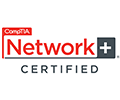
CompTIA’s Network+ is the vendor-neutral networking certification. Our Network+ course is designed to provide the foundation you need not only to be productive on the job but also to be successful in more specialised topics and in your pursuit of vendor-specific certifications. Achieving the CompTIA’s Network+ certification increases your value in the marketplace, providing proof of your knowledge, skills and ability to manage, maintain, troubleshoot, install, operate and configure basic network infrastructure.
Our Network+ training will equip participant with skills and knowledge which will enable you to pass the CompTIA Network+ certification which has industrial recognition and are widely accepted. Accelerate your career by doing your CompTIA Network+ course with GlobalNet.
Our locations are easily accessible by public transportation. Flexibility is our approach, whether you are working full-time or looking for a job; we have classes running during the Day, evenings and weekends.
Target Audience
- IT personnel who need a solid foundation in networking
- Individuals interested in pursuing CompTIA’s Network+ certification exam
Course Outline
Introduction to networking
- Networking Terminology
- Clients and Servers
- Standard Network Models
- Network Topologies
- Physical Network Topologies
- Logical Network Topologies
- Network Transmission Methods
- Network Connectivity Devices
- Hubs, Bridges, Switches and Routers
Networking Models
- The OSI Model
- The TCP/IP Model
- TCP Operation
- UDP Operation
- TCP/IP Ports
Network Media and Hardware
- Data Transmission Methods
- Media Access Methods
- Signaling Methods
- Network Media
- TwistedPair Cable and Connectors
- Fiber Optic Cable and Connectors
- WiringTools and Testing Devices
- Noise Control Techniques
Ethernet Implementations
- Ethernet Networks
- Modern Ethernet Standards
- Legacy Ethernet Standards
- Ethernet Design
- Ethernet Implementation
- SOHO Networks
Wireless Implementations
- Wireless Networks
- Wireless Standards
- Wireless Configurations
- Wireless Security
- Wireless Site Design
IP Addressing and Routing
- IPv4 Addressing
- Default IPv4 Addressing Schemes
- Create Custom IPv4 Addressing Schemes
- Private IPv4 Addressing
- Public IPv4 Addressing
- DHCP Configuration
- APIPA IPv4 Addresses
- Implement IPv6 Addresses
- IP Routing Methods
TCP/IP Application and Services
- TCP/IP Services
- Web Services HTTP/HTTPS
- File Transfer Services FTP/TFTP/SFTP
- Email Services SMTP/IMAP/POP
- Voice Services VoIP
- Quality of Service (QoS)
Network Management and Monitoring
- Network Monitoring
- Network Performance Monitoring
- Simple Network Management Protocol (SNMP)
- Network Monitoring Utilities
- Remote Administration Utilities
Name Resolution
- Domain Name System (DNS)
- Hostname and FQDN
- TCP/IP Commands
Advanced LAN Technologies
- Virtual LANs
- Spanning Tree Protocol (STP)
- Power over Ethernet (PoE)
- Layer 3 Switches
- Implementing a SOHO Network
WAN Infrastructure
- WAN Transmission Technologies
- WAN Connectivity Methods
- Wireless WAN Services
Remote Access
- Remote Network Architectures
- Remote Access Services (RAS)
- Virtual Private Network (VPN)
- Remote Access Protocols PPP/PPTP/L2TP
- Remote Access Authentication Methods RADIUS/TACACS+
- Remote Authentications Protocols PAP/CHAP/EAP
- Remote Access Troubleshooting
System Security
- Computer Security Basics
- Security Threats and Attacks
- Authentication Methods
- Encryption Methods
- IPSec
- Access Control List (ACL)
- Basic and Advanced Firewalls
- Proxies and Gateways
- Intrusion Detection Systems
- Intrusion Prevention Systems
Network Troubleshooting
- Network Troubleshooting Models
- Network Troubleshooting Utilities
- Common Connectivity Issues
- Hardware Troubleshooting Tools
Follow-On Courses
- CCNA and MCSA certifications

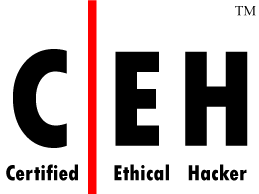
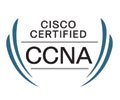
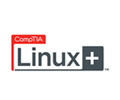
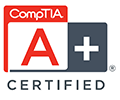

Responses